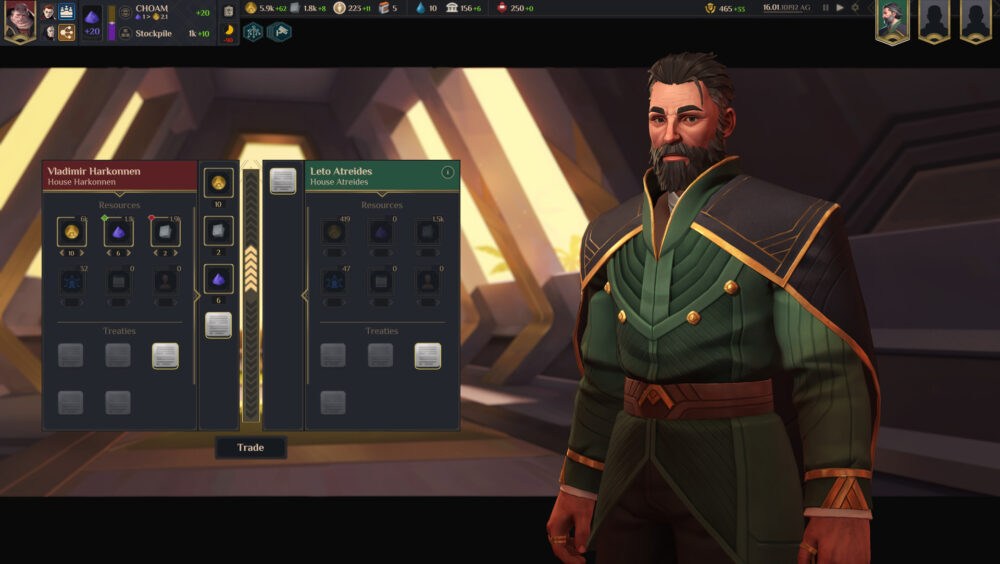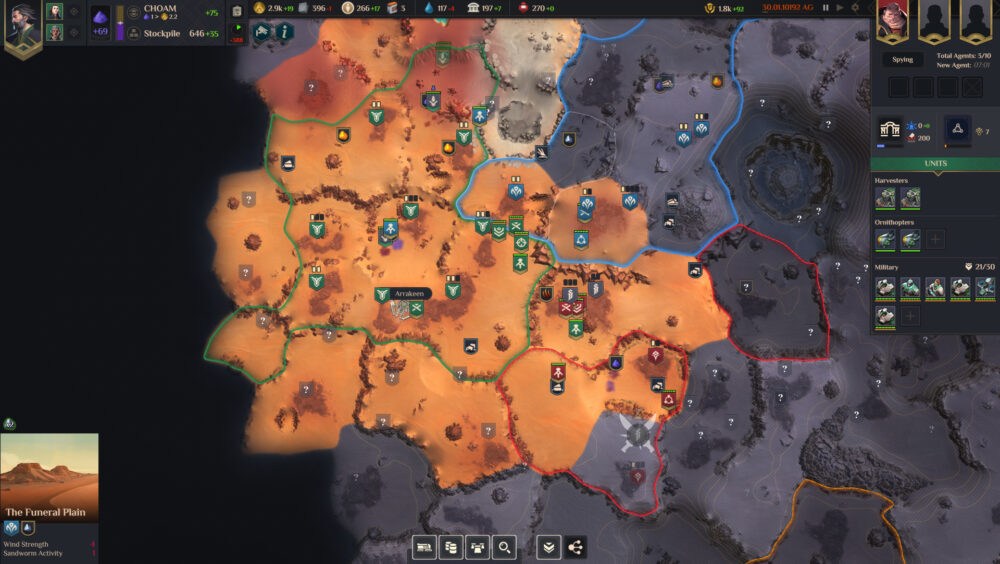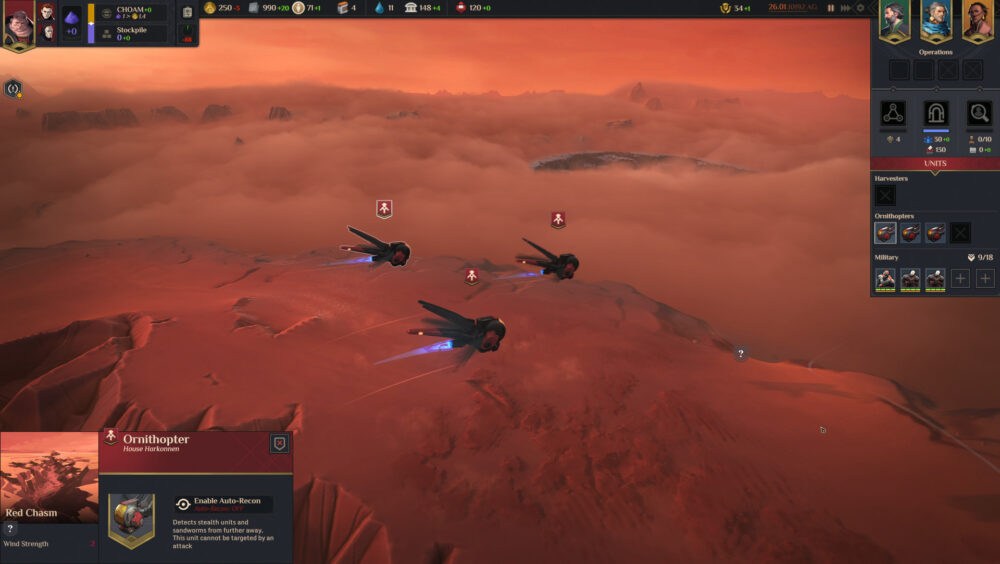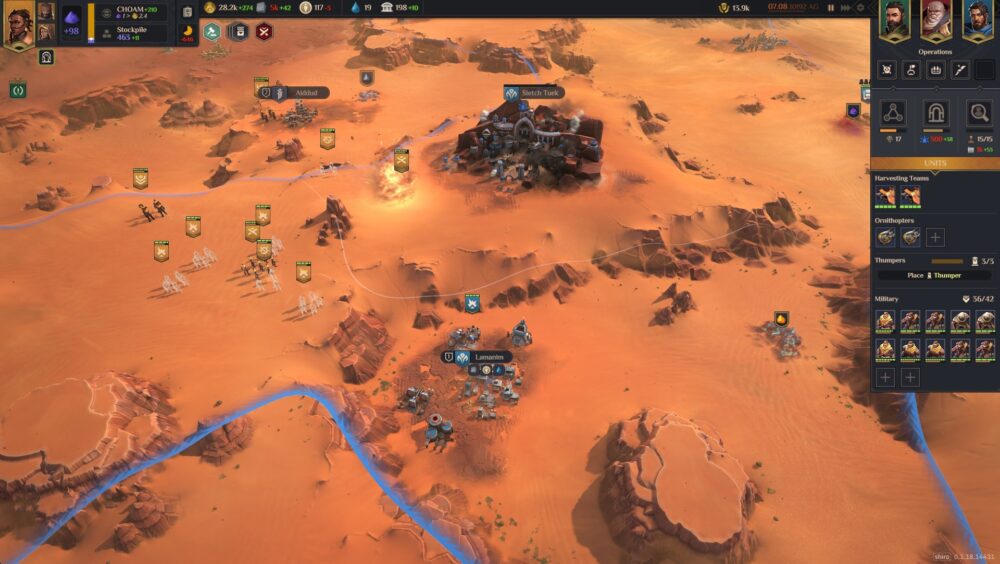Following the resurgence of the Dune franchise with a critically and commercially successful cinema release in 2021, the Internet swiftly recalled the universe’s prominence and grand architectural influence on the strategy gaming genre. Widely and sincerely credited as the blueprint for real-time strategy games’ existence, it was naturally of note and of great interest when Dune: Spice Wars was announced late last year.
Taking the titular commodity at the centre of Dune’s story as its core component, Dune: Spice Wars sees you taking the helm of one of the powerful factions vying for control over Arrakis – home of the great dune and its riches. Playing as one of House Atreides, House Harkonnen, the native Fremen of the Smugglers, and utilising all of the political, military and economic resources at your disposal, your ultimate goal is simple – conquer the Dune by whatever means necessary and secure the most valuable asset in the universe.
Dune: Spice Wars Gameplay

Dune: Spice Wars is a rarity in its gameplay style, combining 4X strategy with real-time gameplay. Your moment to moment decisions are critical to your survival, but it is your long game strategy that will either see you become a ruler or ruled. Naturally, each house or faction offers different outlooks and benefits to specific approaches towards your objective. House Atreides, led by the respected and experienced Duke Leto, can levy extensive political powers. The Baron of House Harkonnen, however, is a conniving and brutal man whose military might and skills of subterfuge should not be underestimated. The Fremen, led by Liet Kynes, are the native people of this world and can muster powerful advantages based on experience and relationships with local villages. The Smugglers, however, specialise in infiltration and economic wit to grow in strength at pace. Narrowing the options to these four iconic groups allows for clear strategies and playstyles to be presented, learned and exploited whilst respecting the source material on which the game is based. Further named characters within each faction can be selected to refine your strategy, too, with heroes such as the infamous Duncan Idaho, and Swordmaster of House Atreides, offering unique sub-benefits to your pre-game plans.
For my first game, I played with House Atreides. The first immediate hurdle of the early access title was a lack of guidance in the form of a rolling tutorial. I was pointed in the general direction of ‘get some spice’ and that was largely the drill. That, and don’t forget to pay the Emperor their taxes. Nevertheless, the gameplay is largely intuitive and after around an hour of play, it was easy to hit a stride as the pathways in the game became apparent. There are only so many things to manage in the endless desert, but doing so correctly and managing risk are crucial. In fact, in terms of complexity levels, the game is relatively straightforward as 4X strategy games go, just touching that genre whilst maintaining a closer focus and aptitude for the real-time strategy elements of play. As such, timing your moves, taking managed risks and being prepared for imminent actions by others all play a large and consistent part in play throughout each phase of the game.

In the early stages, your main objectives are to clear the fog of war, capture villages and locate and farm resources; primarily spice. Securing spice early on is critical, as it is the main source of income in the game and fundamental to paying your periodical (and ever-increasing) Imperial taxes. The game map is split into several sections, each generally containing a resource of value and a village to be controlled. Utilising Dune’s iconic Ornithopters to explore the expanses of Arrakis, gaining ground early is important in developing your faction’s output and sourcing a wide range of infrastructure and raw resources. From wind to water, to construction materials and the very spice that drives plenary output, losing land to your opponents in the early game can be a fatal flaw, as reliance on peers is rarely, if ever, a strong position through the game. Equally, control of the forces of production is an important bargaining chip in the mid-to-late phases of the game where supporting others through their economic hardships brings you significant power to manipulate them and sway the tide of victory in your favour. Equally, developing strong borders with reliable and efficient defences will protect you from the imminent raids and foreign threats to come.
Amidst the dangers of the Dune are more than just your opposing leaders. Local tribes will frequently seek to liberate the lands and villages which you have captured, and your combat and spice sweeping activities trigger vibrations in the earth which attract the massive and deadly sandworms. Playing as the Fremen, these threats are somewhat subdued owing to your local knowledge and understanding of the world. For others, an undefended village can quickly fall foul to raids and the sandworm itself can swiftly consume entire armies or cease your spice productions by destroying your machinery. Truly, the developers have mastered the sense of threat and scale of danger that the legendary sandworms pose on Arrakis, with their proximity a constant point of caution throughout the phases of the game. You cannot fight these mighty beasts and must consider your routes of escape should they ascend from the sands during battles with others.
Dune: Spice Wars Combat

On the topic of combat, this system of the game harkens to the traditional rock, paper, scissors style of strategy battles. Equally, as your society and dominance develop more elite units will become available to you. Even your political sway can help you to advance your armies by summoning the mighty Imperial guards to your aide. Combat in Dune is largely automatic once your units have been commanded, but demands your constant attention nonetheless should the sandworms appear at the site of the battle. The more explosive and dangerous the armaments you deploy, the greater your power but also the risk. The combat system is small and simple in principle but miscalculations can be dire. Additionally, aggressive notions towards other factions can have significant political and reputational consequences.
Politics

The more interesting aspect of Dune: Spice Wars is the political side of the game. The political council on Arrakis, the Landsraad, periodically meets to set key motions in action and vote on the leadership of different aspects of planetary significance. The decisions made here include targeted sanctions, militaristic or economic benefits and the aforementioned determination of leadership positions. From my experience of the game playing as the politically advantaged House Atreides, this was both the most powerful and interesting place to make progress (or otherwise) happen in Dune: Spice Wars. On multiple occasions, I was able to sway votes in my favour. From acquiring Imperial military support to boosting my exchange rate on spice, I achieved several minor victories in the Landsraad. Nevertheless, the system is far from a sure thing for Aterides. House Harkonnen was able to secure the all-important victory condition position of Governor on Arrakis, despite my voting power. Their political position with minor factions consistently saw them achieve the votes they needed to outweigh what I could achieve alone, and their ability to make military manoeuvres with lower penalties meant that they could consistently push the boundaries of other factions’ patience through the game. You certainly cannot ignore the minor factions of Dune: Spice Wars, nor should the criticality of strategic pacts between major houses be doubted. Whilst Arrakis has weighted sway in politics by default, decisions certainly supersede natural advantages.
Victory or Loss
Whatever your strategy in Dune: Spice Wars, there are only 3 ways to secure victory. Dominance speaks for itself, and Governorship has already been covered. The final route is Hegemony; Dune: Spice Wars’ fame system. Every action earns you hegemony points, with 50,000 standing as the threshold for victory. Every faction also has its own checkpoints up to this point where new units, actions and upgrades become available as this score increases. Whatever your on-the-ground plans may be for Arrakis, Hegemony is important to keep a close eye on, not least in terms of keeping an eye on your opponents’ relative progress.
At this early access stage, Dune: Spice Wars shows great promise. The mid game doesn’t show much gameplay evolution, and the point of entry could use a touch more hand holding to get you on board. Despite these points, the game presents consistent challenge, urgency and a need to manipulate the game’s limited, seemingly simple systems with a high level of finesse and caution in order to push your faction forwards. Whilst the game is largely unrevolutionary, what Dune: Spice Wars does offer is a clean, consistent and entertaining real-time 4X strategy with outstanding commitment to its thematic inspiration. A fun and as-you-would-expect title which is worthy of your attention as it continues to develop, early access players will find themselves satisfied, with the potential for being impressed still to come.
Grab your copy here https://store.steampowered.com/app/1605220/Dune_Spice_Wars/
Developer: Shiro Games
Platform: Microsoft Windows
Publishers: Shiro Games, Funcom
Did you enjoy reading our preview of a game before the game gets its final release and its final version? if yes, click here to find more early previews.








You must be logged in to post a comment.